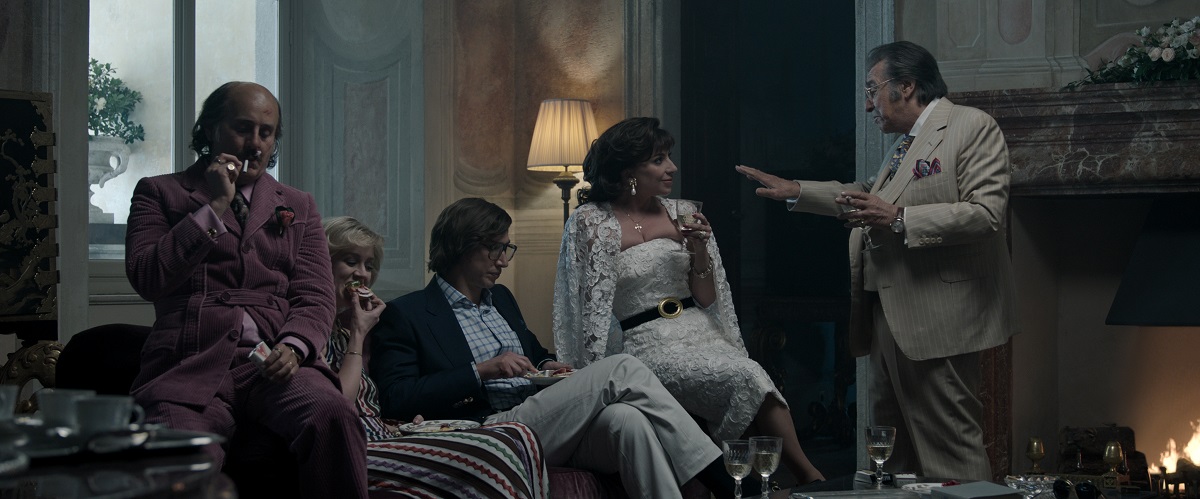
The legacy of Gucci is one that seems built for great drama. It’s a story of a family divided, an empire fought over, a romance that dwindles, and a boiling point that brings murder. But Ridley Scott’s film is perhaps a tad too scattershot to ever truly take off with such material. It explores so much time for the decades of how an empire rose and fell for the family involved. And, yet, it only feels like a handful of great scenes with astounding actors, sparingly used in a picture more concerned with hitting the bullet points than finding much of its own style.
Maurizio Gucci (Adam Driver) is a member of the illustrious Gucci family but prefers to remain distant from the affairs of his family. He soon finds himself attracted to the outgoing Patrizia Reggiani (Lady Gaga), a woman who is honest enough to mock Maurizio’s obsession with law and forward enough to ask him out. They meet at a party and hit it off well. Patrizia is a fierce woman when it comes to business but Maurizio’s father Rodolfo Gucci (Jeremy Irons) still looks down on her for working at a small tricking company. His despisal of their marriage only strengthens their love, especially since Maurizio is hoping to be less dependent on the Gucci name.
Such an escape may be hard to accomplish, however, with such an imposing family. Aldo Gucci (Al Pacino) is the founder of Gucci being more of a fashion staple and wants to provide everything for the couple. He invites them to New York City where he lets them stay in a penthouse and provides Patrizia with all the top-tier fashions she fancies in his store. Patrizia, eager to keep this lifestyle, seeks greater control by taking a higher interest in the brand. As time progresses, the marriage fades and the business of maintaining Gucci as a fashion icon becomes all the more troubled.
The film is kinda split for the scenes that work well and the ones that come off as lukewarm. A business meeting between Aldo and Maurizio is perfectly tense with some great back-and-forth as deception is revealed. The scene of Maurizio and Patrizia having sex at work which transitions to the wedding feels fairly pedestrian with the era-appropriate soundtrack.
And then there’s the wild card we’ve got to address with Jared Leto in the over-the-top role of Paolo Gucci. There’s such a jarring effect with this character, where it feels as though Leto got lost on the way to a Wolf of Wall Street-style movie. He brings ridiculous energy to the film that’s more confounding than comic relief. There’s a very bitter moment when he confronts both Maurizio and Patrizia about being shoved out of the family business. It’d be a great moment of drama if it weren’t for the fact that Paolo’s angry rant wasn’t about comparing the family to chocolate and poop.
And, yes, for those salivating over that picture of Driver in a knit sweater and Gaga in fur amid a ski resort, the film is very, very pretty. All the actors present look fantastic, where Driver can even make absurdly large glasses look sexy. The locations and costumes are always gorgeous, fitting the aesthetic of Gucci being a family of decadence. It’s a pleasing picture to look at, even if it’s a mixed bag of scenes that fluctuate being decent and drab.
House of Gucci lumbers along at a frustrating pace with great actors making the best of a decent script and questionable direction. I’d be tempted to mark it down as style over substance if it weren’t for the fact that the film never fully bores. Just when one scene is ended early before something intriguing can happen, a slightly better scene will take its place. Ridley Scott is known for making his films extra long and I can only hope there’s a director’s cut in the future to deliver a more cohesive film that has more time to explore these characters and get the most out of such top talent. As it stands in its theatrical version, Gucci really only looks look and plays clunky.

 “Deadpool & Wolverine” Review
“Deadpool & Wolverine” Review  “The Boys: Season Four” Review
“The Boys: Season Four” Review  “The American Society of Magical Negroes” Review
“The American Society of Magical Negroes” Review  “Twisters” Review
“Twisters” Review  “Sausage Party: Foodtopia” Review
“Sausage Party: Foodtopia” Review  “Robot Dreams” Review
“Robot Dreams” Review  “Godzilla x Kong: The New Empire” Review
“Godzilla x Kong: The New Empire” Review  “Slave Play. Not a Movie. A Play.” Review
“Slave Play. Not a Movie. A Play.” Review 


